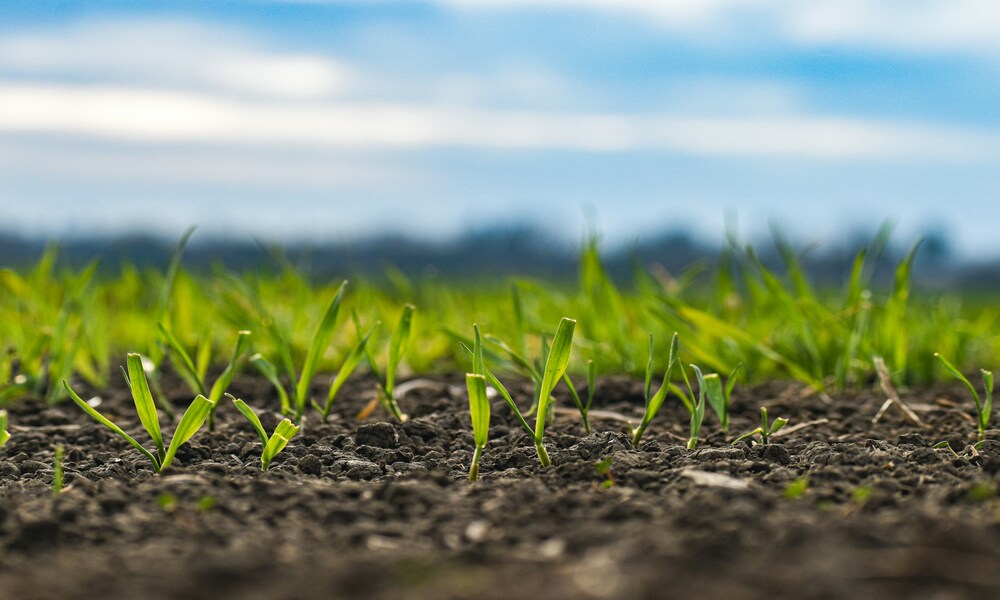The relentless summer heat has seen some farmers firing up their combines for harvest weeks ahead of schedule, while others face irrigation bans. But it’s not just the weather that’s making the headlines. Regulatory changes are reshaping everything from milk contracts to government grants. Meanwhile, at Groundswell, the regenerative agriculture movement gained royal backing, as Prince William made a surprise visit.
Enjoy reading our roundup of the stories that have been making the headlines in July.
Harvest 2025 gets off to a flying start
Summer arrived with a vengeance in the UK, and it brought with it the earliest start to harvest since 2006. The extended dry spell and soaring temperatures saw farmers firing up their combines in June, something that would not normally happen until well into July. The AHDB’s first harvest report shows that 10% of the nation’s winter barley has already been gathered, putting this year’s harvest well ahead of both last year’s 7% and the typical five-year average of just 6% by early July.
However, the story varies dramatically depending on where you are in the country. Eastern England is leading the charge with an impressive 38% of winter barley already harvested, while the South East follows with 19% complete. Farmers further north and west are gearing up to start combining in earnest next week.
Despite the challenging dry conditions during crucial crop development stages, early yield reports are surprisingly positive. Winter barley is averaging 6.9 tonnes per hectare which is 2% above the five-year average. Quality indicators are also encouraging, with specific weights reaching as high as 70 kg/hl in some Eastern areas and moisture levels sitting at a manageable 13.6%.
While the dry weather has helped get harvest underway, it’s created some challenges. Straw volumes are notably short this season, and farmers are being warned to monitor grain temperatures carefully before storage, with real risks of cooling charges or rejected loads if grain exceeds 25°C. Though with the winter wheat harvest on the horizon and oilseed rape beginning to show promise, there’s reason for cautious optimism.
East Anglian farmers hit by irrigation ban
Continuing with another story about the impact of the sweltering temperatures on British farming, over 240 farmers in the Ely Ouse catchment have been dealt a devastating blow. On 3rd July, the Environment Agency imposed a complete ban on water abstraction for crop irrigation, without warning.
The affected area stretches across prime agricultural land in Essex, Norfolk, and Cambridgeshire, including the cities of Cambridge and Ely, leaving growers unable to water their crops during the most critical period of the growing season.
The timing and manner of the ban has sparked fury within the farming community, particularly as it stands in stark contrast to the week’s notice given to six million householders facing hosepipe bans across Yorkshire and the South East. National Farmers’ Union president Tom Bradshaw condemned the lack of prior engagement, calling it “ridiculous” that farmers face immediate restrictions while no broader drought measures are in place for the region. The indefinite ban affects one of Britain’s most productive agricultural areas, raising serious concerns about food security at a time when crops are most vulnerable to water stress.
The move highlights the growing tension between agricultural needs and water conservation as this year’s extreme temperatures have already pushed reservoirs across England to their lowest levels in a decade. While the Environment Agency has committed to reviewing the ban daily, farmers are left in an impossible position; watching their crops suffer in temperatures where irrigation becomes essential for survival. The incident raises urgent questions about whether current abstraction rules are flexible enough to balance environmental protection with food production needs when extreme weather occurs.
Groundswell 2025: Prince William joins call to protect British farming
A well-attended Groundswell event saw the regenerative agriculture movement gain further momentum, as a mix of high-profile speakers engaged attendees in passionate debate. The surprise appearance of Prince William added weight to discussions that ranged from the government’s Land Use Framework consultation to the fundamental question of how British farming can balance food production with environmental demands. On the main stage, industry leaders, including NFU president Tom Bradshaw and Wildfarmed founder Andy Cato, wrestled with the challenge of making farming more nature-friendly without compromising food security.
Regenerative agriculture pioneer Gabe Brown delivered a keynote speech that reframed the entire conversation. Rather than presenting regenerative farming as a rigid set of principles, Brown challenged attendees to see it as a fundamental mindset shift, a perspective that clearly resonated with the audience. His message was complemented by Henry Dimbleby’s session on saving British farming and Professor Tim Lang’s provocative question about why food security isn’t higher on the government’s priority list if it truly represents national security.
Beyond the main stage debates, the event highlighted the growing recognition that agriculture’s future depends on education and public understanding. A dedicated session chaired by shepherdess, sustainable entrepreneur, and education campaigner, Olivia Shave brought together teachers, farmers, and educators to champion the integration of food and farming into the school curriculum. Powerful testimonies about outdoor learning centred around agriculture highlighted an important message: reconnecting people with where their food comes from isn’t just educational, it’s essential for building support and awareness around the farming community’s growing role in society.
Defra reintroduces £150m capital grants for farmers in England
After an unexpected closure last November due to overwhelming demand, Defra has relaunched its popular Capital Grants scheme with £150 million in funding for farmers across England. Secretary of State Steve Reed announced the reopening of applications for 78 specified items designed to support farm infrastructure and environmental improvements, from planting hedgerows and managing boundaries to improving water quality and introducing natural flood management measures. The scheme forms a key part of the government’s New Deal for Farmers, aimed at supporting growth and returning farm businesses to profitability.
The relaunch comes with important changes designed to make access fairer and manage taxpayers’ money more effectively. New funding limits have been introduced for four key groups: £25,000 each for water quality, air quality, and natural flood management improvements, and £35,000 for boundaries, trees and orchards. Farmers can now only submit one successful application per year, a significant shift from the previous system that saw huge demand exhaust funding within months. Four new items have been added to the offer, including woodland condition assessments, wildfire checklists, stone wall repairs, and educational access visits.
The government has learned from the previous round’s rapid closure and is taking a more cautious approach to managing this funding allocation. While applications can be submitted at any time, officials warn that when the £150 million is allocated, the scheme will close again, potentially without much notice. Those with 2024 applications needn’t worry, as the Rural Payments Agency is processing these under the original terms, with most agreements expected to be live by the end of July. Looking ahead, four additional items including pond creation and educational signage will be added later this year, with a completely reformed, more competitive system planned for 2026.
New milk contract rules shake up dairy supply chain
A seismic shift has hit the UK dairy industry as the Fair Dealing Obligations (Milk) Regulations 2024 came into full effect on July 9th, transforming how milk contracts operate across the country. Born from years of farmer frustration with unfair practices exposed during the Covid-19 crisis when producers faced sudden price cuts, unilateral quota implementations, and delayed payments, these landmark rules now apply to all existing and new milk purchase contracts. The regulations represent the culmination of more than a decade of industry pressure, starting with the voluntary code in 2012 and gaining momentum after a 2018 review highlighted the uneven distribution of power in the dairy supply chain.
The new rules fundamentally rebalance the relationship between farmers and processors, introducing mandatory protections that were previously absent from most contracts. All contracts must now be written with clear pricing terms, include a 21-day cooling-off period for farmers to seek independent advice, and crucially, prohibit buyers from making unilateral changes without mutual agreement. Notice periods are capped at a maximum of 12 months for both parties, while exclusive contracts with tiered pricing are banned unless the buyer operates as a democratic cooperative. The regulations also tackle transparency issues by requiring clear pricing mechanisms and giving farmers the right to challenge prices they believe haven’t followed proper procedures.
To enforce these sweeping changes, Defra has established the Agricultural Supply Chain Adjudicator (ASCA), which can investigate breaches, impose financial penalties, and require processors to pay compensation to farmers. The adjudicator offers confidential reporting mechanisms, recognising that many farmers may be reluctant to challenge their buyers directly. While the regulations don’t set minimum prices or dictate specific contract terms, they establish a statutory baseline that ensures all dairy contracts meet acceptable standards. Industry observers believe they will finally give farmers the protection they’ve long sought in what is often their most critical business relationship.
Sources:
https://defrafarming.blog.gov.uk/2025/07/03/capital-grants-now-open-for-applications/
https://www.nfuonline.com/updates-and-information/dairy-contract-legislation-essential-information/





